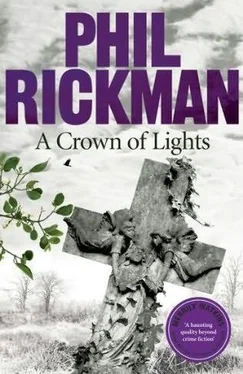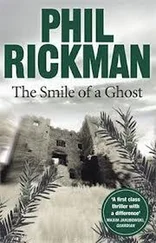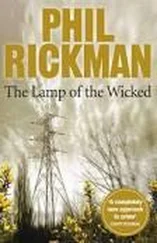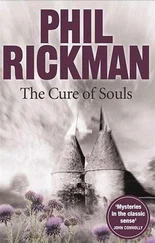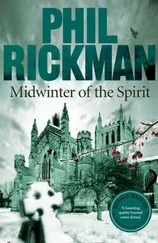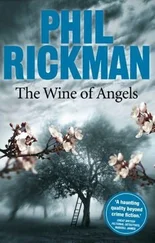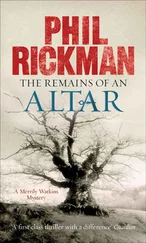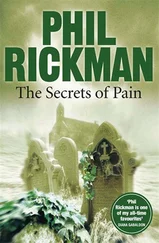Phil Rickman - A Crown of Lights
Здесь есть возможность читать онлайн «Phil Rickman - A Crown of Lights» весь текст электронной книги совершенно бесплатно (целиком полную версию без сокращений). В некоторых случаях можно слушать аудио, скачать через торрент в формате fb2 и присутствует краткое содержание. Год выпуска: 2001, ISBN: 2001, Издательство: Corvus, Жанр: Триллер, на английском языке. Описание произведения, (предисловие) а так же отзывы посетителей доступны на портале библиотеки ЛибКат.
- Название:A Crown of Lights
- Автор:
- Издательство:Corvus
- Жанр:
- Год:2001
- ISBN:978-0-85789-018-4
- Рейтинг книги:3 / 5. Голосов: 1
-
Избранное:Добавить в избранное
- Отзывы:
-
Ваша оценка:
- 60
- 1
- 2
- 3
- 4
- 5
A Crown of Lights: краткое содержание, описание и аннотация
Предлагаем к чтению аннотацию, описание, краткое содержание или предисловие (зависит от того, что написал сам автор книги «A Crown of Lights»). Если вы не нашли необходимую информацию о книге — напишите в комментариях, мы постараемся отыскать её.
A Crown of Lights — читать онлайн бесплатно полную книгу (весь текст) целиком
Ниже представлен текст книги, разбитый по страницам. Система сохранения места последней прочитанной страницы, позволяет с удобством читать онлайн бесплатно книгу «A Crown of Lights», без необходимости каждый раз заново искать на чём Вы остановились. Поставьте закладку, и сможете в любой момент перейти на страницу, на которой закончили чтение.
Интервал:
Закладка:
But this was not Betty’s vision any more – if it ever had been.
‘Leave it with me, yeah?’ George said. ‘Blessed be, man.’
‘I’m quite psychic, you know.’ Juliet Pottinger had what Betty regarded as a posh Lowland Scottish accent. ‘I was about to go into town, and then I thought, no, if I go out now I shall miss something interesting.’
Which was a better opening than Betty could have hoped for.
Lower Lodge was an extended Georgian cottage on the edge of a minor road about two miles out of Leominster and a good twenty-five miles east of Old Hindwell. Once away from Old Hindwell, Betty’s head had seemed to clear. The day was dull but dry, the temperature no worse than you could expect in late January. Out here, she felt lighter, less scared, less oppressed.
Mrs Pottinger’s house was full of books. Six bookcases in the hall, with two piles of books beside one of them, propped up by an umbrella stand. In the long kitchen, where she made Betty tea, the demands of reading and research seemed to have long since overtaken the need for food preparation. Books and box-files were wedged between pans on the shelves and under cups and plates on the dresser. The only visible cooker was a microwave, and an old Amstrad word processor with a daisywheel printer took up half the kitchen table. There was – small blessing – no sign of a Daily Mail .
Juliet Pottinger was about sixty-five, with a heavy body, layered in cardigans, and what you could only call wide hair. Her seat was a typist’s chair, which creaked when she moved. She was working, she said, on a definitive history of the mid-border.
‘I’m sorry I didn’t phone first,’ Betty said. ‘I just happened to be... passing.’
‘But you live at Old Hindwell, you say?’
‘At St Michael’s.’
‘Oh,’ said Mrs Pottinger. ‘Oh...’
It meant Betty didn’t have to spend too long explaining her interest in the church, and no need to make reference either to her religion or the ruined building’s palpable residue of pain.
‘The widow sold it, then?’ said Mrs Pottinger. ‘Thought she would. It was in the Hereford Times about Major Wilshire... old regiment man. The SAS. He wrote to me – as you know, of course.’
‘Mrs Wilshire passed over to me some documents relating to the house and the church, and your letter was one of them. That’s how we learned about Mr Penney.’
‘Oh, I feel such a terrible wimp about that, Mrs Thorogood. I wanted to write up the whole story, but I doubt the Brecon and Radnor would have printed it, for legal reasons. Also, I ramble so, become over-absorbed in detail – always been more of a historian than a journalist. And, of course, the local people were against anything coming out.’
‘Why do you think that was?’
‘In case it reflected poorly on them, I suppose. In case it drew attention to their affairs. Gareth Prosser the elder was the councillor then, upholding the family’s local government tradition of conserving the community in whatever ways are most expedient and saying as little as possible about it in open council. My brief, as local correspondent for the paper, was to report nothing that everyone didn’t already know. Except, of course, in the case of poor Terry, when I was instructed not to report what everyone already knew. Oh dear, it really has not been a happy place, I’m afraid.’
‘You felt that?’
‘I always knew that. However, I don’t want to depress you. You do, after all have to...’
‘Live with it? That’s why I need to know about its true history. It oppresses me otherwise.’
‘Does it?’ Mrs Pottinger’s eyes became, in an instant, shrewdly bird-like.
‘Yes, it... I...’ Betty’s banging heart was confirming that it was too late for subterfuge. ‘I’m, I suppose you’d say, sensitive to atmosphere – acutely sensitive.’
‘ Are you indeed?’
‘The first time I saw that ruined church, I had a very negative reaction, which I kept to myself because my husband loved it... was enraptured. For some time I kept trying to tell myself we could, you know, do something about it.’
‘You mean feng shui or something?’
‘Or something,’ Betty said carefully. ‘The place upsets me. It unbalances me in ways I can’t handle. After we moved in, that became stronger, until I could feel it almost through the walls of the farmhouse. I hope I don’t sound like an idiot to you, Mrs Pottinger.’
She was amazed at what she’d just said – all the things she hadn’t been able to say to Robin. Mrs Pottinger did not smile. She pulled off her half-glasses and thought for a few moments, tapping one of the arms on a corner of the Amstrad.
‘While we were living in Old Hindwell,’ she said at last, ‘we acquired for ourselves a dog. It was a cocker spaniel we called Hopkins. My husband would take him for walks morning and evening. By using the footpath which follows the brook past the church, it was possible almost to circumnavigate the village. Have you walked that particular path yet?’
‘I haven’t, but I think my husband has.’
‘It’s a round trip of about a mile and a half, a perfect evening walk. But would Hopkins follow it? He would not . Within about twenty yards of the church – approaching from either direction – that dog would be off! Disappeared for a whole night once. Well, after this had happened two or three times, Pottinger tried putting him on a lead. But when they reached some invisible barrier – as I say, about twenty yards from the church, where the yew trees began – Hopkins would start tugging in the opposite direction with such force that he almost strangled himself. Pottinger used to say he was afraid the poor creature would choke himself to death rather than continue along that path.’
Mrs Pottinger replaced her glasses.
‘As you can imagine, that’s another story I didn’t write for the Brecon and Radnor Express .’
Betty found the story chilling, but not surprising. The only time she’d ever seen anyone on that path was the night the witch box was delivered.
‘Did you try to find out what might have scared your dog?’
‘Naturally, I did. I was fascinated, so I went to visit Terry.’
Betty registered that Penney was the only male – not even her own husband – whom Mrs Pottinger had referred to by his first name.
‘It was the first time I’d actually been up to the rectory, as he never seemed to invite people there. Normally I’d collect his notes and notices for the B and R at the church, on Sundays after morning service. The rectory was far too large for a bachelor, of course – or even for a married clergyman with fewer than four children. One can understand why the Church is now shedding so many of its properties, but in those days it was still expected that the minister should have a substantial dwelling. Terry, however, was... well, it was quite bizarre...’
Betty remembered how Mrs Pottinger’s letter to Major Wilshire had ended, with the suggestion that Old Hindwell existed for her now as little more than a ‘surreal memory’.
‘His appearance, I suppose, was becoming quite hippyish. He’d seemed quite normal when he first arrived in the village. But after a time it began to be noticed that he was allowing his hair to grow and perhaps not shaving as often as he might. And when I arrived at the rectory that day – it was about this time of year, perhaps a little later – Terry showed me into a reception room so cold and sparsely furnished that it was clear to me that it could not possibly be in general use. I remember I put my hand on the seat of an old armchair and it was actually damp! “Good God, Terry,” I said, “we can’t possibly talk in here .” I don’t know about you, Mrs Thorogood, but I can’t even think in the cold.’
Читать дальшеИнтервал:
Закладка:
Похожие книги на «A Crown of Lights»
Представляем Вашему вниманию похожие книги на «A Crown of Lights» списком для выбора. Мы отобрали схожую по названию и смыслу литературу в надежде предоставить читателям больше вариантов отыскать новые, интересные, ещё непрочитанные произведения.
Обсуждение, отзывы о книге «A Crown of Lights» и просто собственные мнения читателей. Оставьте ваши комментарии, напишите, что Вы думаете о произведении, его смысле или главных героях. Укажите что конкретно понравилось, а что нет, и почему Вы так считаете.
